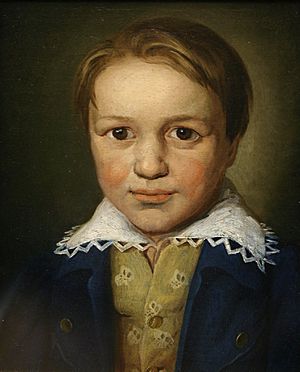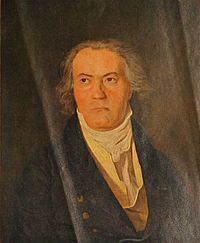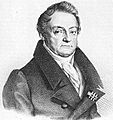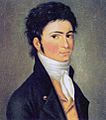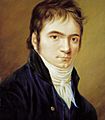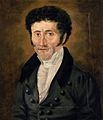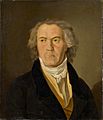Ludwig van Beethoven facts for kids
Quick facts for kids
Ludwig van Beethoven
|
|
|---|---|
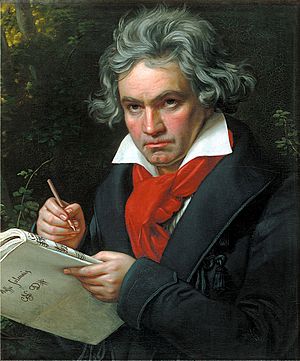
A portrait by Joseph Karl Steiler, 1820
|
|
| Born | |
| Baptised | 17 December 1770 |
| Died | 26 March 1827 (aged 56) |
| Occupation | Composer and pianist |
| Signature | |
Ludwig van Beethoven (baptized 17 December 1770 in Bonn – 26 March 1827 in Vienna) was a German composer. He wrote classical music for the piano, orchestras, and other instruments. Some of his most famous works include his third ("Eroica"), fifth, sixth ("Pastorale"), and ninth ("Choral") symphonies. He also wrote the eighth ("Pathetique") and fourteenth ("Moonlight") piano sonatas, and the piano piece Für Elise.
Beethoven lived when the piano was a new instrument. As a young man, he was a very talented pianist. He was popular with important people in Vienna, Austria, where he lived. However, in 1801, he began to lose his hearing. By 1817, he was completely deaf. Even though he could no longer play in concerts, he kept writing music. During this time, he composed some of his greatest works. Many people believe he is one of the greatest classical composers ever. When Beethoven died, thousands of people attended his funeral.
Contents
Beethoven's Early Life
We don't know much about Beethoven’s early childhood. He was baptized on December 17, 1770, so he was likely born a few days before. His parents were Johann van Beethoven and Maria Magdalena Keverich. His father was a musician at the court in Bonn. This is where Beethoven lived until he was a young man. His father gave him his first lessons in piano and violin.
Beethoven was a child prodigy, like Mozart. But unlike Mozart, Beethoven didn't travel much until he was 17. By then, his piano teacher was a man named Neefe. Neefe had learned from Carl Philipp Emanuel Bach, who was the son of Johann Sebastian Bach. Neefe told the Elector (a ruler) that young Beethoven should travel. So, Beethoven was allowed to go to Vienna. He might have had a few lessons from Mozart there. But then, Beethoven got a letter saying his mother was dying. He quickly went back to Bonn. After his mother died, Beethoven had to help take care of his family. He played the viola in the Elector's orchestra, started to compose, and made many friends. Many of his friends were aristocrats who helped him in his music career.
Moving to Vienna
In 1792, the Elector let Beethoven go to Vienna again. They expected him to return, but Beethoven stayed in Vienna for the rest of his life. He wanted more composition lessons from Mozart, but Mozart had just died. So, he took lessons from Haydn instead. Haydn was a good teacher, but he went to England a year later. Beethoven then took lessons from Johann Georg Albrechtsberger. Albrechtsberger taught him how to write complex music, which helped him become a great composer.
Beethoven wanted to be famous as a pianist and composer. He started meeting important, aristocratic people. Some of them had heard him play in Bonn, so his name was becoming known in Vienna. It also helped that he was a student of the famous Joseph Haydn. Many rich people in Vienna loved music and had their own private orchestras. Some of them gave Beethoven places to live when the Elector of Bonn stopped sending him money in 1794.
Beethoven started performing in private homes. He became known for his improvisations (making up music on the spot). In 1795, he performed one of his piano concertos at a concert. He also had his first published work, a group of three Piano Trios. Haydn had heard them and advised Beethoven not to publish the third one. However, Beethoven did publish it, and it became the most successful. His next published work was three piano sonatas, which he dedicated to Haydn.
Becoming Famous
Beethoven was becoming famous, traveling to places like Prague. He wrote a lot of chamber music (music for small groups of instruments). In 1800, he gave his first public concert with his own music. He conducted his First Symphony and the Septet. Many publishers wanted to publish his new works. Beethoven was becoming very well-known as a composer. During this time, he wrote his most famous piano sonata: No. 14, in C sharp minor, nicknamed "Moonlight."
The Middle Period of Music
Beethoven worked very hard to deal with his problems. He composed much more music, including his Third Symphony, called the Eroica. He first named it Bonaparte to honor Napoleon, whom he admired. But when Napoleon crowned himself emperor in 1804, Beethoven thought he was just a dictator. He tore up the title page of the symphony. Beethoven stayed in Vienna that year, working on an opera and giving piano lessons.
In 1805, Beethoven wrote his only opera, which was called Fidelio. It had two performances but was not performed again for eight years. Beethoven made several changes to the opera over time. The overture (opening music) he wrote for the 1806 performance is now known as Leonore 3. It is often played separately at concerts. The opera is about a woman who disguises herself as a man to rescue her imprisoned lover.
Beethoven continued to write many compositions. These included a Violin Concerto, more symphonies, piano concertos, string quartets, and chamber music. Two of his greatest symphonies were written in 1806: Symphony No. 5 and Symphony No. 6 "Pastorale". The Fifth Symphony is known for its dark and powerful sound. The Sixth Symphony is famous for sounding like the countryside. He also wrote Piano Concerto No. 4 and Piano Concerto No. 5 "Emperor".
He earned money by dedicating works to rich people in exchange for fees and by selling his music to publishers. Sometimes he earned money from concerts, but it was not a steady income. He wanted a job as a music director for the emperor, but he didn't get it. However, in 1809, three rich aristocrats gave him an income for the rest of his life. This was on the condition that he stayed in Vienna. This meant Beethoven did not have to worry so much about money. He was asked to write music for Egmont, a play by Goethe. The overture from Egmont is often played in concerts.
Beethoven's Deafness
In a letter from June 29, 1801, Beethoven told a friend about a terrible secret: he was becoming deaf. For some time, he had fevers and stomach pains. A young man does not expect to become deaf, but he was starting to accept it. He found it hard to hear what people were saying. Just as he was becoming known as a great composer, it was a terrible shock to realize he was losing his hearing.
In 1802, he stayed in Heiligenstadt, which is now part of Vienna. There, he wrote a famous letter known as the Heiligenstadt Testament. It was dated October 6 and showed his growing frustration with his deafness. He asked people to forgive him if he couldn't hear them. This very emotional letter was found among his papers after his death. He never sent it to anyone.
Later Life and Final Works
By 1814, Beethoven was at the peak of his fame. The people of Vienna thought he was the greatest living composer. Royal families often invited him to their palaces. This was the year he played his famous Piano Trio Op. 97 The Archduke. That was the last time he played the piano in public. His deafness made it impossible to continue.
Beethoven had many problems when his brother Caspar Carl died, leaving a 9-year-old son. Beethoven took care of his nephew for several years. It was a difficult relationship, involving many legal issues and arguments. In 1826, his nephew joined the army, and Beethoven stopped being his guardian.
Beethoven's last years were unhappy. For a time, he composed very little. Then, in 1817, he began composing again. He wrote his last two symphonies, a large mass called Missa Solemnis, his last five piano sonatas, and a group of string quartets. These string quartets were so new and difficult that few people at the time understood them. Today, many people consider them the greatest works ever written for string quartet.
His Ninth Symphony is called the Choral Symphony. This is because it includes a choir and solo singers in the last movement. At the time, people found this unusual, as symphonies were normally just for orchestras. Beethoven chose words from a poem by the German poet Friedrich Schiller: An die Freude (Ode to Joy). The poem is about living together in peace and harmony. This important message is why the Ode to Joy has been chosen as the Anthem for the European Union. The Ninth Symphony was first performed on May 7, 1824. After one movement, the audience applauded loudly, but Beethoven couldn't hear them. One of the singers had to turn him around so he could see the clapping.
Beethoven died on March 26, 1827. About 20,000 people came into the streets for his funeral. The famous poet Franz Grillparzer wrote the funeral speech. One of the people carrying a torch was Franz Schubert. Schubert died the next year. In 1888, Beethoven’s and Schubert’s remains were moved to another cemetery in Vienna and placed side by side.
Beethoven's Musical Legacy
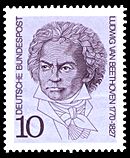
Beethoven’s music is often divided into three periods: Early, Middle, and Late. Most composers change their style as they get older. These changes are not sudden, but they help us understand the different parts of his composing life.
His first period includes works from his youth in Bonn and his early days in Vienna, up to about 1803. His middle period starts with the Eroica Symphony and includes most of his orchestral works. His last period includes the Ninth Symphony and the late string quartets.
Beethoven is probably the most famous of all composers. He had a strong personality. He lived during the time of the French Revolution and believed strongly in independence and living free from unfair rulers. This made him a hero to many people.
His music was so famous that many composers in the 19th century found it hard to write. They worried they would be compared to him. For example, Johannes Brahms took a long time to write his First Symphony. He felt everyone expected him to be the next Beethoven.
Museums and Monuments
There is a museum called the Beethoven House in central Bonn, where he was born. The city also hosts a music festival, the Beethovenfest, which has been held every year since 2007.
The Ira F. Brilliant Center for Beethoven Studies at San José State University in California is a museum and research center. It focuses only on Beethoven's life and works.
The Beethoven Monument in Bonn was revealed in August 1845. It was the first statue of a composer in Germany. Vienna also honored Beethoven with a statue in 1880.
Beethoven in Space
The third largest crater on Mercury is named after him. So is the asteroid 1815 Beethoven.
Beethoven's music is also on the Voyager Golden Record. This record contains sounds, images, and music from Earth. It was sent into outer space with the two Voyager probes.
Images for kids
-
Beethoven's birthplace at Bonngasse 20, Bonn, now the Beethoven House museum
-
E. T. A. Hoffmann, self-portrait, c. 1820
-
Beethoven in 1823 by Ferdinand Georg Waldmüller
-
Bust of Beethoven by Hugo Hagen, 1892, Library of Congress, Washington, D.C.
See also
 In Spanish: Ludwig van Beethoven para niños
In Spanish: Ludwig van Beethoven para niños
 | Chris Smalls |
 | Fred Hampton |
 | Ralph Abernathy |


